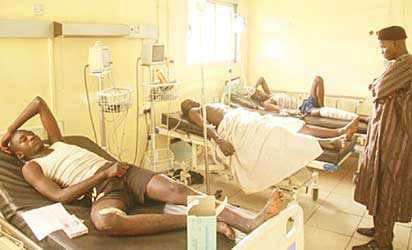
The Commissioner of Police, Federal Capital Territory Command, Joseph Mbu gave a bizarre order last week: henceforth, any resident of Abuja who wishes to refill his gas cylinder would have to obtain a permit from the police as movement of gas cylinders from one place to another in the Federal Capital Territory has been banned!
For a country where gas is not piped into individual houses, Mbu’s order is as bizarre as it is absurd as the logistics of the more than five hundred thousand Abuja residents that use gas cylinders queuing up to obtain police permit to refill their gas are simply unimaginable.
But commissioner Mbu’s order represents the general frustration of most residents of the Federal Capital Territory as they brace up to the bomb attacks by
the terrorist group, Boko Haram.
Although Abuja was attacked several times by the Boko Haram group in the past as seen in the United Nations Building bombing and the police Headquarters, there was a period of peace as security agencies increased their surveillance on the city and life was almost returning to normal in the Territory.
This relative normalcy was violently punctuated when the Boko Haram sect bombed a bus terminus in Nyanya twice and killed more than one hundred people while over two hundred others were injured. With last week’s bombing of the Emab plaza where another 21 people lost their lives, the constant bombing has changed normal life as well as business in the FCT.
The most fundamental impact of constant bombing by the Boko Haram Sect especially in the FCT is the sense of permanent vulnerability that haunts residents of the capital city. Before the Boko Haram began to make inroads into the FCT, it was unthinkable the serenity of the city and it’s almost water tight security would be so easily compromised.
The consequence of this sense of permanent vulnerability, especially in government offices is that stricter security measures are put in place to check the inflow of both vehicular and human movement into the offices.
There is a more intense screening of visitors; cars are subjected to more thorough checks while their underbellies are scanned as security measures. In fact, to underscore the seriousness of the heightening fear of Boko Haram in the Capital Territory, the streets in front of and besides the headquarters of the Nigerian Army, Navy and Airforce are all closed to vehicular traffic.
And for residents of Nyanya and other satellite towns around the northern axis of the FCT, the bombing in Nyanya that claimed hundreds of lives has further compounded the already bad traffic gridlocks usually experienced during rush hour.
In the aftermath of the Nyanya bomb blast, the military authorities set up a check point on the bust Nyanya-Keffi road to screen vehicles coming into Abuja.
The consequence of that road block is that a traffic snarl is created stretching up to five kilometres which residents of these satellite towns have to contend with every morning and evening. A journey that ordinary takes fifteen minutes sometimes stretches to over three hours.
Apart from the traffic jam created as a result of the military check points, the worst hit people as a result of the Boko Haram activities in the Federal Capital Territory are the open garden operators. During the administration of Mallam Nasir El-Rufai, gardens were created to serve as relaxation spots where people go to after work.
In view of the fact that there were few places people could go to relax after work, these gardens became a natural attraction for many people. Apart from providing a spot for relaxations, the gardens serve as veritable sources of employment for the teeming population of youths in the capital city.
The heightened activities of the Boko Haram means that less people are willing to risk their lives to patronise these leisure places.
The bombing of the Emab plaza in Abuja recently has further put a strain on the big shopping malls that have remained popular for shoppers . Before the bombing of the Emab plaza, there were rumours that some of the big shopping centres in Abuja were targets of the terrorists. With the Emab plaza incidence, the movesments of Abuja residents have been restricted.
The fear in Abuja has the potential to scare investors away as no investor would be willing to invest in volatile places.
One other effect that is not very pronounced but which has affected how Abuja residents live is the tendency to suspect certain people to be Boko Haram suspects either because of their dressing or their religion.
Although Boko Haram has targeted both Christians and Muslims in its murderous actions, the fact that they claim to be Muslims has tended to make some people not too comfortable with certain dresses. For instance, it is more likely that a car driven by somebody who dresses like a Muslim would be stopped by security agents and searched than somebody who is dressed in western clothes. Although this practice is still not widespread, it is gradually gaining momentum.
The polarity insurgency is creating amongst people has affected the way residents of Abuja live their lives.
The earlier government stepped in to check the activities of these insurgents, the better for the sanity of this most beautiful city of Nigeria. Abuja is becoming increasingly divisive. Sad. Time is running out. All hands must be on deck to stop the insurgency and return normal life to this pride of all Nigerian cities.
Source vanguard



























